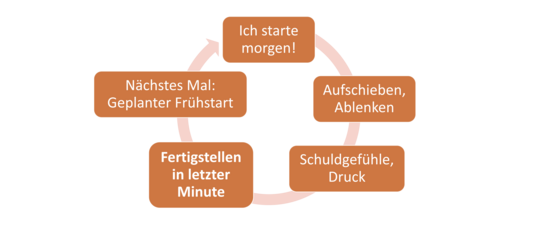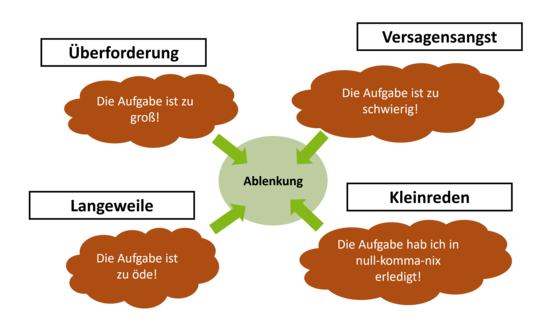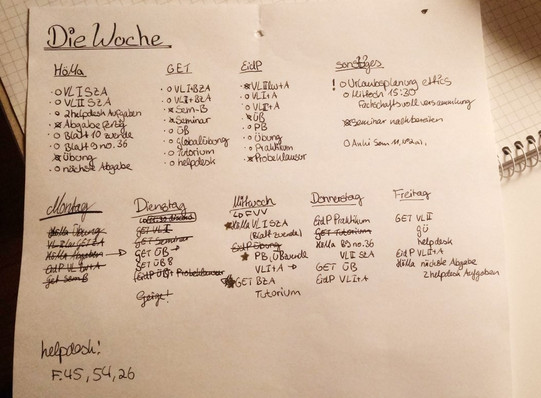Procrastination
It happens to almost every student sooner or later: procrastination knocks on the door! That's why we want to give you some background information on the subject, which might help you to get up the nerve to study.
The Circle
Off tomorrow? Well, but I still want to tidy up, clean up, and yes the information about the average annual temperature of Greenland really interests me now - after all, I wonder if the new Porsche Taycan would still drive in the cold. Well, and then my colleagues come by and I know that it's definitely not going to work out today. And so you get up the next morning with an annoyed feeling of again not having done all taks at hand. This can go on until you sit in front of the computer, stressed out, and know: "Now I have to! I can't help it. When the submission is ready at the last minute, the motto is: next time - next time everything will be different! But I still have to go shopping and I haven't cleaned the storeroom for a long time - oh, and can you actually ride on moose?

Four ways into procrastination and maybe out of it
Here are four thoughts that have probably caused you to procrastinate. To avoid distraction, it's best to work in a tidy workplace with your cell phone and other temptations far away. Nevertheless, it is of course important that you consciously take breaks. What else you can do against procrastination depends on the reason you procrastinate:
1) Overload
The task is too big!
- Take the time to get an overview. Maybe write yourself a to-do list and leave some space, then write prioritization on it.
- "Divide and conquer" says the computer scientist: large tasks may initially trigger feelings of powerlessness. So start formulating smaller task packages that you can then work through piece by piece. And each crossing out of tasks on the to do list will fill you with joy: Promise!
2) Fear of failure
The task is too difficult!
- In your studies, sooner or later everyone fails at one task or another. This is normal! People who are very successful in their studies or sometimes even parents who have not studied at all may lack in understanding this from the outside.
- If the feeling is there that you are dealing with an unsolvable task, you can still write down piece by piece what you know and what you can solve. Then some research in the lecture slides usually helps.
- The more precisely you know where the problem lies, the easier it is for you to look for a solution yourself.
- Maybe friends can give you a good tip.
3) Boredom
The task is so boring!
- Especially here it is important to put away the distraction, because this is one of the most difficult opponents!
- It's not always easy: but for a lot of things, you can talk yourself into having fun.
- To know yourself and your learning strategies is a good thing: Maybe it helps you to do sports in between or to listen to music in the afternoon against the midday slump, so that some motivation from outside supports you.
- Last but not least, try to ask yourself: Why do I need this? Studying is a lot closer to what you want to do professionally than it was at school. It is worthwhile to think about your future goals and to see what skills you will need then.
4) Talking small
I will finish the task in no time, so now I can do something else.
- It helps to create a schedule in advance, where you plan extra time (e.g. for travel time).
- Maybe you just postpone the reward to the end.

Procrastination: Causes
People who procrastinate are usually looking for a quick reward. For longer tasks, this reward is not as tangible. The emotion center in the brain is larger for many procrastinators, so fear of failure and the short-term reward effect are more prominent. In addition, creative day-dreaming is fueled by the large emotion center. However, you should distinguish between procrastination and laziness: the latter is a conscious decision not to work. So observe yourself, and you will surely find a way out of procrastination.
Motivation is key
The easiest way to avoid the temptation of quick rewards is to avoid them in the first place. This requires a large portion of motivation for the task or the activity.
1) Motivation
One way to gain motivation is to ask: Why am I actually doing this? You're bound to find a whole range of reasons why it's interesting to study electrical engineering, since it's needed for so many areas. Whether it's the energy transition, semiconductors, hardware or algorithms and machine learning. In your studies, you have time to try out a whole range and use the practical experience to motivate yourself and find your focus. What? Just have a look:
- SHK positions (assistant at the chair)
- Working student position in the company
- Electronics-AG
- Get Racing
Try out several things and see what you like - after all you will spend some time with it.
2) Mindset
This is a bit more abstract at first, but basically the brain wants to learn and rewards understanding. You will make the following experience: Once you have understood things correctly in the semester, then you only have to practice for the good grades and no longer for passing.
Weekly schedule and to-do lists
Many people find it helpful to make a structured list at the beginning of the week of everything that needs to be done sush as uni with courses and times for working on the submissions and exercises on the one hand, and on the other hand, things like household, shopping, meeting friends and pursuing hobbies should also not be missing. A good approach is to do the most time-consuming and important tasks right at the beginning of the week, because something always comes up and it can also be that you need longer than planned for one or the other. Always leave one day free to work on the last postponed tasks.
If you sort your to-dos, then it helps to weight the tasks (* to ***), depending on how important / urgent what is. Whereby you may have encountered the sentence: "What is urgent is far from being important". (Keyword: Eisenhower principle). Make categories for university, household etc. think about which system (paper / app) works for you. Also, it helps to go into detail: Instead of "Review Math," write "Sheet 6 Assignment 3."

General learning tips
Minimize distraction
Already mentioned above, but still very important: minimize distractions. Turn off the phone or set it to silent. If you distract yourself on the PC, then maybe set up a separate user account without games, Insta, etc. and possibly without notifications. Also, keep your desk tidy and work materials handy. Why this is so important: After two seconds of distraction, it takes the brain 15 to 20 minutes to get back into the flow.
Learning with social pressure
It is often helpful to learn with social pressure. Sit down in a place where it is quiet and many others are also learning, such as the university library. Then it's just as easy to switch off when you get home. On the other hand, you should be able to understand a lot of the content in this study program, which is helped by the exchange in a study group. Therefore, look for a study group with which you can work well concentrated and do not stray from the topic when discussing tasks.
Try out learning techniques
There is a whole sea of learning techniques: Many use the Pomodoro technique, which you can easily find on the Internet. Do some research and try out a technique for a few days and you will see if it suits you.
Literature
This article is based to a large extent on experiences in the study and exchange with other students. Listed are other websites that have been referred to here:
- https://procrastination.com/what-is-procrastination
- https://hbr.org/2019/12/10-quick-tips-for-avoiding-distractions-at-work
- https://www.mindtools.com/pages/article/newHTE_96.htm
Written by Leon Marcel Gerigk March 2022, with thanks to Clara Sophie Nagel for discussion of content.







